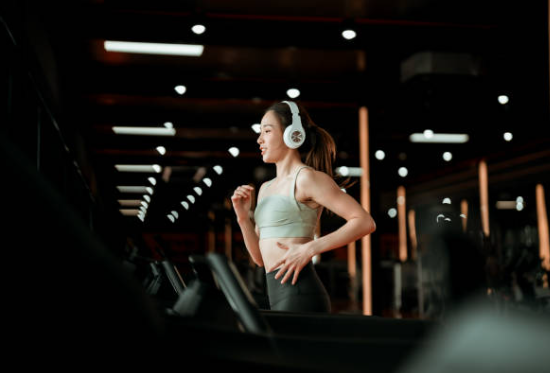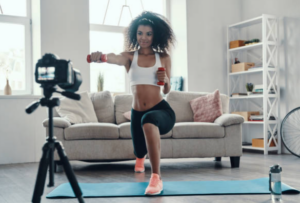

Striving for Wellness


In today’s digitally-driven society, social media has become an influential force in shaping our perceptions of beauty, health, and fitness. From Instagram influencers showcasing their toned physiques to TikTok tutorials on the latest workout trends, the online world bombards us with images and messages that can profoundly impact our self-image and health goals. In this blog, we’ll delve into the pervasive influence of social media on fitness fads and the pressure it exerts on us to attain an elusive standard of perfection.
In recent years, the fitness industry has experienced a boom fueled by social media’s pervasive influence. What once started as traditional workout routines and dietary plans has evolved into a dynamic landscape of ever-changing trends and fads. Platforms like Instagram, TikTok, and YouTube have become breeding grounds for fitness influencers and enthusiasts alike, eager to share the latest workouts, diets, and wellness practices with their followers.
One of the driving forces behind the rise of fitness fads is the desire for quick fixes and instant gratification. In a world where time is of the essence and patience is in short supply, many are drawn to fads promising rapid results with minimal effort. Whether it’s a 30-day challenge promising to transform your physique or a detox tea claiming to melt away stubborn belly fat, these fads tap into our innate desire for immediate results, often at the expense of long-term sustainability.
Additionally, the allure of novelty plays a significant role in the proliferation of fitness fads. As consumers, we’re constantly bombarded with new and exciting products, workouts, and techniques vying for our attention. From wearable fitness trackers and virtual reality workouts to unconventional exercise modalities like aerial yoga and pole dancing, there’s no shortage of options to pique our interest and keep us engaged.
Social media platforms have also democratized fitness, allowing everyday individuals to share their wellness journeys and inspire others along the way. What started as humble before-and-after photos documenting personal transformations has blossomed into a multi-billion-dollar industry, with influencers monetizing their platforms and partnering with brands to promote products and services to their followers.
However, with the democratization of fitness comes a downside: misinformation and unqualified advice run rampant. The lack of regulation and oversight on social media means that anyone with a smartphone and an internet connection can position themselves as an authority on health and wellness, regardless of their qualifications or expertise. This has led to the spread of dubious fitness fads and pseudoscientific practices that can do more harm than good.
Social media platforms have revolutionized the way we consume information, interact with others, and perceive ourselves. With billions of users worldwide, platforms like Instagram, Facebook, TikTok, and YouTube wield immense power in shaping societal norms, including our perceptions of beauty, health, and fitness.
One of the most profound ways social media influences our health goals is through the pervasive promotion of idealized body images. Scrolling through our feeds, we’re bombarded with images of impeccably toned bodies, flawless skin, and perfectly curated meals that set an unrealistic standard of beauty and wellness. These images are often heavily edited and filtered, presenting a distorted reality that can lead to feelings of inadequacy, comparison, and self-doubt.
Moreover, the rise of fitness influencers and wellness gurus on social media has contributed to the proliferation of harmful beauty and health standards. Influencers with massive followings often promote restrictive diets, extreme workout regimens, and questionable supplements under the guise of health and wellness, perpetuating the myth that achieving a certain physique is synonymous with happiness and success.
The pressure to maintain a flawless online presence can also take a toll on our mental health. Studies have shown that excessive social media use is linked to higher levels of anxiety, depression, and body dissatisfaction, particularly among young people who are more susceptible to the influence of social media. Constantly comparing ourselves to others and striving for unattainable perfection can erode our self-esteem and contribute to negative body image issues.
Furthermore, social media algorithms are designed to prioritize content that elicits strong emotional reactions, leading to a phenomenon known as “compare and despair.” When we see our peers achieving milestones, receiving accolades, or showcasing their seemingly perfect lives online, it’s easy to feel like we’re falling short in comparison. This constant cycle of comparison can fuel feelings of inadequacy and perpetuate a sense of never being “enough.”
Despite its drawbacks, social media also has the power to inspire positive change and foster a sense of community. Many individuals use social media as a platform to share their wellness journeys authentically, providing support, encouragement, and inspiration to others along the way. By promoting body positivity, self-acceptance, and inclusivity, these voices challenge the dominant narrative of perfection perpetuated by mainstream media and influencers.
In today’s image-centric culture, the pressure to achieve perfection is omnipresent, amplified by the relentless onslaught of idealized images and curated lifestyles propagated on social media platforms. Whether it’s the pursuit of a flawless complexion, a sculpted physique, or the perfect diet, the quest for perfection can exert a profound toll on our mental and physical well-being.
One of the primary sources of pressure stems from the idealized body images perpetuated by social media influencers and celebrities. Scrolling through our feeds, we’re inundated with images of chiseled abs, toned arms, and hourglass figures, often achieved through extreme dieting, rigorous exercise regimens, and in some cases, surgical interventions. These images set an unrealistic standard of beauty that is unattainable for the majority of people and can lead to feelings of inadequacy, comparison, and low self-esteem.
Moreover, the pressure to maintain a flawless online presence can contribute to a phenomenon known as “social media anxiety.” Constantly striving to present the perfect image to our followers can be exhausting and anxiety-inducing, leading many individuals to engage in performative behaviors and exaggerated displays of happiness and success to garner validation and approval from others.
The pressure to conform to societal beauty standards can also have detrimental effects on our mental health. Studies have shown that excessive social media use is associated with higher levels of body dissatisfaction, disordered eating behaviors, and poor self-esteem, particularly among young people who are more susceptible to the influence of social media. The relentless pursuit of an unattainable ideal can lead to anxiety, depression, and other mental health issues, creating a cycle of insecurity and self-criticism.
Furthermore, the pressure to achieve perfection extends beyond physical appearance to other areas of our lives, including career success, relationships, and personal achievements. The constant comparison to others and the fear of falling short can lead to feelings of inadequacy and imposter syndrome, undermining our sense of self-worth and happiness.
In an era where filters and Facetune reign supreme, it’s easy to lose sight of what’s real and authentic. The pressure to maintain a flawless facade can erode our self-esteem and disconnect us from our true selves. Instead of embracing our imperfections and celebrating our uniqueness, we may find ourselves striving for an unattainable standard of perfection that leaves us feeling empty and unfulfilled.
In a digital landscape saturated with wellness trends, fitness fads, and beauty hacks, it can be challenging to discern fact from fiction. From detox teas promising miraculous weight loss to skincare products claiming to erase wrinkles overnight, the market is flooded with products and practices that often overpromise and underdeliver. Navigating this cacophony of conflicting information requires a critical eye, a discerning mind, and a commitment to prioritizing evidence-based practices over quick fixes.
One of the first steps in navigating the noise is to educate oneself on the fundamentals of health and wellness. This means seeking out reputable sources of information, such as scientific journals, peer-reviewed studies, and accredited health organizations, to gain a deeper understanding of the principles that underpin good health. By arming ourselves with knowledge, we can better evaluate the claims and promises made by wellness influencers and brands and make informed decisions about our health and well-being.
Another important aspect of navigating the noise is to approach health and wellness with a sense of skepticism. While social media platforms may be rife with success stories and testimonials touting the latest miracle cure or superfood, it’s essential to question the validity of these claims and consider the potential biases and conflicts of interest at play. Remember that anecdotes are not evidence, and correlation does not imply causation. Instead of relying solely on anecdotal evidence, seek out scientific research and expert opinions to inform your health decisions.
Additionally, it’s crucial to prioritize sustainability and long-term wellness over quick fixes and short-term gains. Many fitness fads and wellness trends promise rapid results with minimal effort, but often fail to deliver lasting benefits or, worse, can be harmful to our health. Crash diets, extreme workout regimens, and miracle supplements may yield temporary results, but they are rarely sustainable in the long run and can have negative consequences for our physical and mental well-being.
Instead of chasing after the latest fad or trend, focus on building healthy habits that promote overall well-being. This includes eating a balanced diet rich in fruits, vegetables, whole grains, and lean proteins, engaging in regular physical activity that you enjoy, getting adequate sleep, managing stress, and prioritizing self-care. By adopting a holistic approach to health and wellness, you can achieve sustainable results that enhance your quality of life and promote long-term vitality.
Furthermore, it’s essential to cultivate a mindset of self-compassion and self-acceptance in the face of societal pressures and unrealistic beauty standards. Instead of striving for perfection, embrace your imperfections and celebrate your uniqueness. Remember that true beauty comes from within and is not defined by the number on the scale or the size of your clothes. By practicing self-love and acceptance, you can navigate the noise of social media with confidence and authenticity, and prioritize your well-being above all else.
As consumers, we have the power to demand transparency and authenticity from the influencers and brands we follow. Instead of idolizing unattainable ideals, we can celebrate diversity, inclusivity, and body positivity in all its forms. By sharing our own struggles and triumphs authentically, we can inspire others to embrace their unique journey to health and happiness, free from the constraints of societal norms and unrealistic expectations.
The pervasive influence of social media on fitness fads and the pressure of perfection is undeniable, but it doesn’t have to dictate our health goals or self-worth. By cultivating a critical eye, practicing self-compassion, and prioritizing authenticity over illusion, we can reclaim control of our narratives and redefine what it means to be healthy and beautiful in a digital age. Remember, true beauty lies not in perfection, but in embracing our flaws, celebrating our strengths, and honoring the journey toward self-love and acceptance.
Sustainable Shades For many DIY enthusiasts and design aficionados, a fresh coat of paint is…
Cruelty-Free Solutions for a Healthier You Chronic inflammation can be a relentless foe, disrupting our…
Unleashing Your Brain's Potential In today's fast-paced world, maintaining sharp mental focus and cognitive agility…
Exploring DIY Organic Makeup Fixers For the eco-conscious beauty enthusiast, the quest for flawless makeup…
A Sensitive Exploration The clean beauty movement has taken the beauty world by storm. Consumers…
Taming the Mane Frizz – the bane of smooth hair dreams. It can transform a…
This website uses cookies.